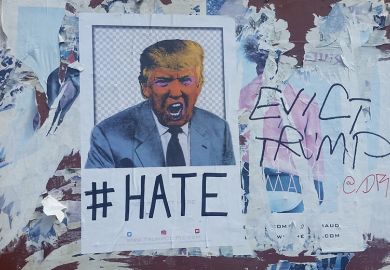To say our guard against disinformation was down in 2016 is an understatement. There was no guard. Russia’s Internet Research Agency ran #MAGA-themed Twitter accounts that received tens of thousands of retweets a week. It also managed a highly influential cross-platform Black Lives Matter organisation, mounted physical protests in the US, and even had a podcast on Stitcher. Meanwhile, Facebook allowed them to pay for ads in roubles.
2020 was different. Journalists did an admirable job in their measured and sceptical response to the Hunter Biden laptop story. Platforms, federal agencies and academics worked together to identify and suspend coordinated social media attacks. And on election day, fact-checkers were ready to address false narratives as they arose. Researchers into disinformation, such as ourselves, ended 3 November feeling a sense of relief.
Everything since then, however, has been an unmitigated disaster.
Millions of Americans continue to believe Donald Trump won the election despite all evidence to the contrary. But there is no sign that foreign troll factories or information operations (which do go on) meaningfully influenced rumours of election fraud. Instead, authentic political voices that seek power at the cost of shared trust in democratic processes have propagated the belief.
More significant yet, however, may be the effect of Americans’ own online communities. Huge portions of the public struggle with cognitive dissonance and are unable to accept loss, leaving them prone to conspiracy theories that promise them forbidden knowledge. A case in point is QAnon, which asserts that a cabal of cannibal paedophiles controls the world’s governments and whose numerous online followers were among those who stormed the US Capitol on 6 January – an accomplishment foreign trolls only dreamed of.
In the wake of the insurrection, there is broad agreement that society’s response to misinformation must adapt. But it is clear that neither the social media platforms nor our governments are well designed to do so. The platforms have taken action, but the damage is already done – and their raison d’être to meet demand for hyper-personalised content is inherently at odds with society’s need to engage in a shared objective reality.
This presents a void that educators, journalists and researchers must fill. Last September, we at Clemson University released SpotTheTroll.org to fight social media disinformation. But we have learned from the more than 750,000 users so far that humans are really bad at spotting trolls, even when told what to look for. We suspect it may be that people have become too accustomed to seeing real users doing the fundamental work of the trolls: spreading political extremism, driving division and framing those who disagree with them as irreconcilable enemies.
So what more can we do? First, researchers need to better understand the social and psychological needs that are too routinely fulfilled by misinformation and reflect on how these needs can be met through alternative channels. When the public is angry, scared or confused, they will grab any lifeline, and we can’t allow the only ropes available to have no anchor in reality.
Second, journalists and educators need to build more resilient consumers of media – particularly social media. Perhaps the main thing society has lost that must be regained is trust: in experts, democratic processes and each other.
Some interventions have focused on teaching students how to be critical consumers of media. But critical thinking can be a double-edged sword. QAnon, for instance, has been critiqued as a massive live-action role-playing game. If that is true, central to it is the application of critical thinking and problem-solving skills. Community members analysed, evaluated and synthesised information in cryptic “Q drops” to guide their beliefs and actions.
Their reasoning had obvious deadly consequences, but the problem was not lack of critical thinking but the fact that they were reasoning from inside a deep social media hole shared with only like-minded individuals. No one taught them to recognise what that hole might look like before they were in it or how to look for help to get out. Even now, many in the QAnon community find it easier to keep digging than to try to climb out.
Free and open social media will always have ideological and conspiratorial holes to fall into. So far, society’s response has been to try to fill them in. But this is Sisyphean. We need to start supplying ladders instead.
In particular, we must emphasise to students (of all ages!) that thinking critically does not mean dismissing everything – even organisations created with a basic fact-checking mission – as biased. Critical thinking must be taught also with an understanding of how journalism and democratic institutions function, so that individuals can make informed choices about which they decide to trust.
We must teach social media consumers to critique their own biases and appreciate how their relationships with others influence them. And we must flag up the difference between disagreeing with another’s conclusions and disagreeing with the facts or values they build them on. It is, for instance, possible to be concerned about human trafficking without believing in QAnon.
It is hard to look at the divisions we see in front of us and be hopeful. However, we have completely overhauled the media landscape once this generation already. We can do it again, but this time with purpose.
Darren L. Linvill is an associate professor in communication and Patrick L. Warren is an associate professor in economics at Clemson University, South Carolina.
POSTSCRIPT:
Print headline: After the insurrection, informed reasoning is even more critical
Register to continue
Why register?
- Registration is free and only takes a moment
- Once registered, you can read 3 articles a month
- Sign up for our newsletter
Subscribe
Or subscribe for unlimited access to:
- Unlimited access to news, views, insights & reviews
- Digital editions
- Digital access to THE’s university and college rankings analysis
Already registered or a current subscriber?








